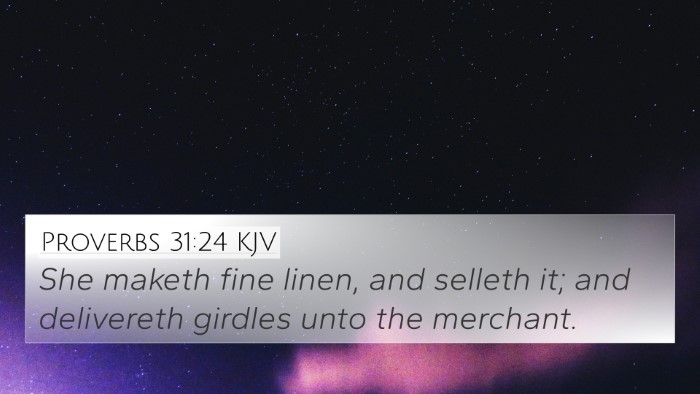Understanding Proverbs 31:14
Proverbs 31:14 states: "She is like the merchants' ships; she bringeth her food from afar." This verse speaks to the qualities of a virtuous woman, emphasizing her industriousness and resourcefulness. Various public domain commentaries, including those by Matthew Henry, Albert Barnes, and Adam Clarke, provide rich insights into the meaning behind this verse.
Insights from Commentaries
-
Matthew Henry:
Henry highlights that the virtuous woman demonstrates a diligent spirit and a strong work ethic. He likens her to merchants who seek valuable resources from far and wide, indicating that she goes beyond her immediate surroundings to provide for her household.
-
Albert Barnes:
Barnes points out that this metaphor illustrates the woman's ability to procure food and necessities from distant places, symbolizing her commitment to meeting the needs of her family. He notes that it reflects a sense of responsibility and dedication.
-
Adam Clarke:
Clarke emphasizes the economic and social implications of the woman's actions, suggesting that her entrepreneurial spirit and acumen in securing goods from afar not only benefits her family but also showcases her intelligence and foresight.
Contextual Analysis
To fully appreciate Proverbs 31:14, it’s essential to consider its context within the surrounding verses that describe the characteristics of the ideal woman. The passage serves as a celebration of virtuous living, focusing on various traits such as strength, wisdom, and industriousness. Each descriptor builds upon a vivid picture of a woman who is capable and hardworking.
Cross References and Thematic Connections
This verse can be linked with several other scriptures that enhance its meaning and demonstrate thematic connections throughout the Bible:
- Proverbs 12:4: "A virtuous woman is a crown to her husband." This aligns with the theme of a devoted and industrious nature contributing to the household.
- Proverbs 31:16: "She considereth a field, and buyeth it." This shows her proactive nature in business and investment, similar to seeking food from afar.
- Proverbs 10:4: "He becometh poor that dealeth with a slack hand: but the hand of the diligent maketh rich." The idea of diligence reflects the attributes of the woman in Proverbs 31.
- 1 Timothy 5:8: "But if any provide not for his own... he hath denied the faith." This emphasizes the importance of providing for one’s family, a principle that the virtuous woman embodies.
- Luke 12:42: "Who then is that faithful and wise steward?" This parallels the woman's role as a steward of her household, managing resources wisely.
- Matthew 25:14-30: The parable of the talents indicates that productive and resourceful behavior is rewarded, echoing the industrious essence of the woman in Proverbs.
- Job 31:16-17: Job's declaration of care for those in need reminds us of the virtuous nature present in Proverbs 31.
Connecting Bible Verses Through Cross-Referencing
Cross-referencing Bible verses offers profound insights into how various passages resonate with one another. The connections made through scriptures illuminate themes of diligence, responsibility, and virtue.
Tools and Guides for Cross-Referencing
To enhance your understanding of cross-referencing in Bible study, consider using:
- Bible Concordance: A tool that helps locate specific verses and themes throughout the Bible.
- Bible Cross-Reference Guide: This guide offers suggestions for related scriptures, aiding in comparative analysis.
- Cross-Reference Bible Study Methods: Effective strategies for engaging with the text through inter-Biblical dialogue.
- Bible Chain References: A method of connecting verses that revolve around similar themes or ideas.
Conclusion
Proverbs 31:14 carries deep significance in illustrating the qualities of a virtuous woman. By engaging with this verse and its interconnections to other biblical texts, believers can glean wisdom about industriousness and dedication to family. Cross-referencing tools assist in connecting these scriptures, lending depth to scripture study and enriching the understanding of God's Word.






